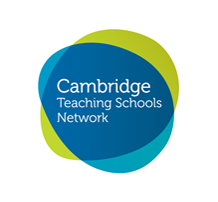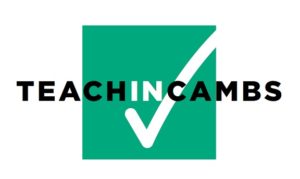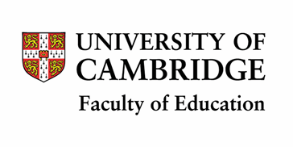Train to Teach – Frequently Asked Questions
-
Who provides initial teacher training?
Essentially, there are two kinds of training: university-led and school-led. School-led providers are referred to as SCITTs (School Centred Initial Teacher Training). All ITT courses involve placements in schools to gain teaching experience. The teacher training providers in the Cambridgeshire area are:
 |
 |
 |
| Go to the website | Go to the website | Go to website |

|

|

|
 United Teaching United Teaching
|
||
Please note that for a full list of local providers you can go to the Get into Teaching website.
2. What is the difference between PGCE, QTS and EYITT?
QTS stands for Qualified Teacher Status. To gain QTS you need to demonstrate that you have met the Teachers’ Standards. If you have QTS you can teach in any state school in England, Wales or Northern Ireland. Different qualifications are required to teach in Scotland.
PGCE stands for Postgraduate Certificate of Education. It is an academic qualification which usually takes around 9 months to complete. It provides a grounding in the theory, research and practice of teaching and learning. It will usually involve attending university sessions and the submission of assignments. A PGCE doesn’t qualify you to teach on it’s own, so you would need to gain QTS alongside it to work as a qualified teacher.
Most teacher training courses enable you to complete a PGCE and to gain QTS at the same time, whilst some courses will only enable you to gain QTS. Have a look at the details of the teacher training courses you are interested in to find out whether they offer the opportunity to complete a PGCE alongside QTS. You can obtain a PGCE after QTS if you would like to – there is no requirement to do both at the same time.
EYITT stands for Early Years Initial Teacher Training. It qualifies you to teach in an Early Years setting such as a nursery, or in a school reception class. It does not qualify you to teach older primary school pupils.
- Tips for applying for a teacher training place:
You will need to apply via the DfE Apply website: Apply for teacher training – GOV.UK (www.gov.uk) Make sure you check that your referees are happy to provide a reference and that they will be able to reply promptly when asked for a reference. Applications are often held up because referees are slow to provide references.
You no longer have to pass the professional skills tests, however, some teacher training providers conduct their own literacy and numeracy tests as part of the recruitment process.
It is a good idea to gain some experience in a school before starting the course, if you possibly can. You should approach a school directly and ask if you can shadow a teacher/subject/pupil. Don’t leave it until the end of the year as schools may not be able to accommodate you then.
You can find more tips and guidance on writing your application here: Tips on applying for teacher training | Get Into Teaching (education.gov.uk)
- What qualifications do I need?
Candidates for Initial Teacher Training Education are required to present evidence of their qualifications as listed below:
- A degree in any subject (the classification required varies from provider to provider – check with your preferred provider)
- Maths and English grade C /4 or above at GCSE or the equivalent (see below for equivalencies)
- Science grade C/4 or above at GCSE or the equivalent if applying for primary ITT.
- What if I want to train to teach a subject at secondary level and I don’t have a degree in that subject?
You could take a Subject Knowledge Enhancement (SKE) course, if
- your degree wasn’t in your chosen subject, but is closely related
- you studied the subject at A level, but not at university
- you have relevant professional experience, and an SKE course would show you how to apply that to the curriculum and your teaching
- you would benefit from a short refresher course in your chosen subject
Details of SKE course providers can be found here on the Get into Teaching website.
NB: if you have a joint honours degree, you can train to teach in either of the subjects in your degree name.
- What if my qualifications are from overseas?
If all or part of your qualifications are from outside the UK, you should contact the schools or universities you would like to train with, as they make the final decision if your qualifications meet the minimum requirements – you may be asked to formally recognise any overseas qualifications through UK NARIC. The government Get into Teaching website is offering help with this currently. Contact them on 0800 389 2500 and they can provide you with:
- Guidance on your equivalent qualifications
- A free UK NARIC statement of comparability (this usually costs £49.50 plus VAT) once you’ve submitted your application, if required by your provider.
- What if I can’t find my original certificates?
For those candidates who have lost their original UK certificates, the ITT provider will accept confirmation direct from the school or college where the exams were taken. This would take the form of a signed letter direct to the provider confirming candidate name, Examination Board, year taken and grades achieved.
Alternatively, confirmation of results may be obtained direct from the relevant Examination Board. Currently, in
England there are three Examination Boards which include past Exam Boards no longer in existence. Contact details for these are set out below:
| AQA www.aqa.org.uk | Edexcel www.edexcel.com | OCR www.ocr.org.uk |
For Scottish or Irish qualifications candidates are advised to contact the relevant Exam Boards.
Please note that Certificates in Adult Literacy or Adult Numeracy are NOT accepted as equivalent to GCSE passes at grade C.
- What counts as equivalents to GCSE grades?
If you do not have a GCSE at grade C /4 or above in English, maths or science, ITT providers will accept certain approved equivalent examinations. Please check with them, which qualifications would be acceptable. Some suggestions:
| Overseas Qualifications | In the first instance please check the equivalency of your qualifications with UK NARIC http://www.naric.co.uk/NARIC/Default.aspx.
|
| English GCSE equivalent for candidates whose first language is not English | The IELTS test (with an average minimum score of 6) is usually acceptable. This needs to be in all four areas of the academic test and be a recent test (dated within 2 years). For details of exam dates and exam centres in your area please consult the website www.ielts.org, by clicking on the test takers page. |
- What if I don’t have the appropriate GCSE grades?
The Equivalency Testing Company www.equivalencytesting.com offers English, maths and science GCSE equivalence exams for candidates, and we will accept a pass in these exams when taken at an approved centre. Candidates can take a 12 unit GCSE syllabus home study course followed by an exam or can sit the exam only.
For further details contact 01277 203336 or [email protected]
The following organisations offer people the chance to study online for GCSEs in English, Maths and Science:
| Institution | Contact | Website |
| ICS International Correspondence Schools
(ICS Learn) |
Breckenridge House,
274 Sauchiehall Street, Glasgow, G2 3EH Tel: 0808 252 5816 |
https://www.icslearn.co.uk/ |
| Oxford Open Learning | 4 Kings Meadow, Oxford,
OX2 0DP Tel: 0800 975 7575 |
http://www.ool.co.uk/ |